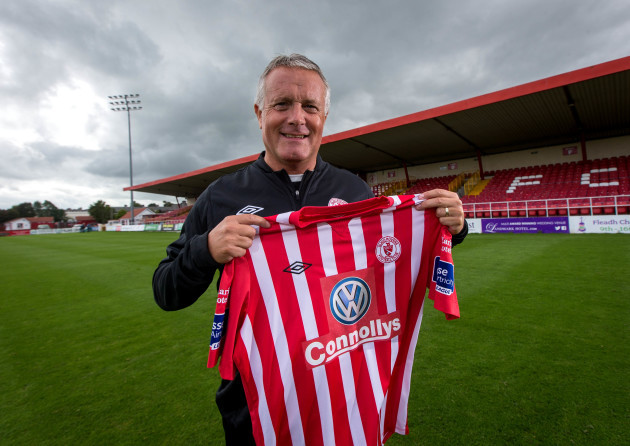IT’S A FACT of life that our league loses talent to the UK. When a player moves there’s another ready to step up.
Other losses are more keenly felt.
A couple of years ago we lost Simon Elliott, who moved to Swindon. You might not know his name.
Elliott was the CEO of Volkswagen Group Ireland, who at one stage sponsored half the teams in the Premier Division through VW and SEAT, the remaining half knocking at his door.
While commercial rivals Ford sponsored the FAI Cup, Elliott got more bang for his buck if two VW sponsored teams played each other on TV.
A former director of Scunthorpe United, he is a football fan who looked favourably on our league and was always willing to chat.
Since his move, only Sligo Rovers have retained Volkswagen Group sponsorship.
It’s the reality of League of Ireland football. As with other aspects of the game, people who love football are vital.
Some assume attracting sponsors is easy, or should be. It is not. A potential sponsor looks for return on their money, such as new customers. That return might not be there.
Take large manufacturing companies around the country often suggested as potential sponsors. Most would get no benefit as they don’t sell directly to the public.
Look at Pfizer in Cork, their drugs are distributed by pharmacists and doctors. The general public aren’t going to demand a Pfizer product from their doctor just because their local club might be sponsored by the company.
The return isn’t there so typically large multinationals prefer to support charities and community organisations through their social and corporate responsibility programme, that way they positively influence the communities where their employees live.
The competition for sponsorship is massive. For local sponsorship you compete for the attention of local businesses with junior football, GAA and rugby clubs as well the local arts community.
Even then, a local pub might get a better return providing pre-match finger food for supporters rather than sponsoring the match they’ll attend.
For larger sponsorship pots you compete with slick operations within inter-county GAA, provincial rugby and even national charities. You can end up competing with your own national associations.
One club tells of having a sponsorship agreement drafted with a company who subsequently withdrew to sponsor the FAI summer schools.
Such a situation is rare, but each year the FAI offer advertising boards at every ground as part of the overall league sponsorship deals.
Clubs don’t see direct income from this. The hoardings are taken on the halfway line and behind the goal; the most valuable were clubs able to sell them directly.
It’s such a competitive environment, showing return on investment to a potential sponsor is vital.
Too often we sell little more than a mention at half-time or a photo in the programme. We don’t explain how that will get our fans into the sponsor’s business. Advertising hoardings might only be seen by the same 1500 people every fortnight, it’s hard to turn that into new business.
For front of shirt sponsorship we sell the possibility of live matches and highlights on Soccer Republic but too often we don’t explain its worth. The rate for front of shirt sponsorship dropped during the recession and some clubs struggle to get any interest.
Anecdotally, few clubs across both divisions are breaking €20,000 for a season’s worth of advertising on their shirt, which to most will seem ludicrously cheap.
Look at the amount of time that a company logo will be on screen compared with the cost were you to buy that amount of time in advertising space.
Fyffes would pay RTÉ handsomely for adverts to achieve the same number of viewers of their logo as they get from TV coverage of Dundalk.
The key thing these days is to get your sponsors ‘activated’ – and to stop calling them sponsors, it’s all ‘partners’ now. Sponsorship has moved on to creating an environment where partners become part of the story, and want to stay part of the story.
Dundalk and Cork City do sponsorship activation particularly well. They’ve built an environment where corporate partners are seen as fellow supporters; which builds loyalty among fans.
Fyffes have produced a couple of excellent promotional videos for Dundalk this season, like the one below. Clonakilty Foods put their product in front of fans at media events and half time at matches.
Soho bar in Cork erected a massive Cork City jersey on their premises in Cork and advertise televised games and deals for supporters.
In instances like this, everyone wins.
Fundamentally, clubs have to target sponsorship from companies that sell directly to their support base — or community — and clubs have to explain how they will direct their supporters to that company. After that, they have to work together.
Supporters can elevate the whole process by following the same motto that I’ve used since I first got involved in football: ”Support the businesses which support your club, and tell them that’s why you’re supporting them.”


